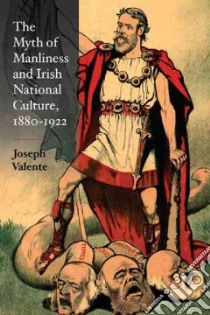The Myth of Manliness in Irish National Culture, 1880-1922 - 9780252035715
Un libro in lingua di Joseph Valente edito da Univ of Illinois Pr, 2010
- € 57.20
- Il prezzo è variabile in funzione del cambio della valuta d’origine
"This is undoubtedly a pioneering study. It discusses constructions of Irish manhood in one of the most decisive periods of Irish nationalist mobilization with a degree of ingenuity, authority, and commitment that is simply unmatched in the field."---Joe Cleary, author of Outrageous Fortune: Capital and Culture in Modern Ireland
"Valente proceeds to significantly reshape our sense of what the major ideological structures of Irish natinalist culture were during this period. He demonstrates so convincingly that his conception of manlines was absolutely crucial to a wide range of cultural discourses that, by the time I finished I was wondering why no one had seen all this before. But no one had."---Marjorie Howes, author of Colonial Crossings: Figures in Irish Literary History
"Valente's book on manlines and Irish nationlism is one of the most startlingly illuminating books I have ever read on Irish literature."---Vicki Mahaffey, author of Reauthorizing Joyce
This study supplies the first contextually precise account of the male gender anxieties and ambivalences haunting the culture of Irish nationalism in the era preceding the Irish Free State. To this end, Joseph Valente focuses upon the Victorian ethos of manliness, the specific moral and political logic of which proved crucial to both the translation of British rule into British hegemony and the expression of Irish rebellion as Irish psychomachia. The influential operation of this ideological construct is traced through a wide variety of contexts, including the career of Ireland's dominant Parliamentary leader, Charles Stewart Parnell; the institutions of Irish Revivalism; the writings of both canonical authors (Yeats, Synge, Gregory, and Joyce) and subcanonical authors (James Stephens, Patrick Pearse, and Lennox Robinson); and the major political movements of the time.
The construct of manliness remains very much alive today, underpinning the neo-imperialist marriage of ruthless aggression to the sanctities of duty, honor, and sacrifice. Mapping its earlier colonial and postcolonial formations clarifies its continuing danger and appeal.
Informazioni bibliografiche
- Titolo del Libro in lingua: The Myth of Manliness in Irish National Culture, 1880-1922
- Lingua: English
- Autore: Joseph Valente
- Editore: Univ of Illinois Pr
- Collana: Univ of Illinois Pr (Hardcover)
- Data di Pubblicazione: 15 Dicembre '10
- Genere: LITERARY CRITICISM
- Argomenti : Masculinity in literature Irish literature History and criticism Masculinity Ireland Psychological aspects
- Pagine: 289
- ISBN-10: 0252035712
- EAN-13: 9780252035715


